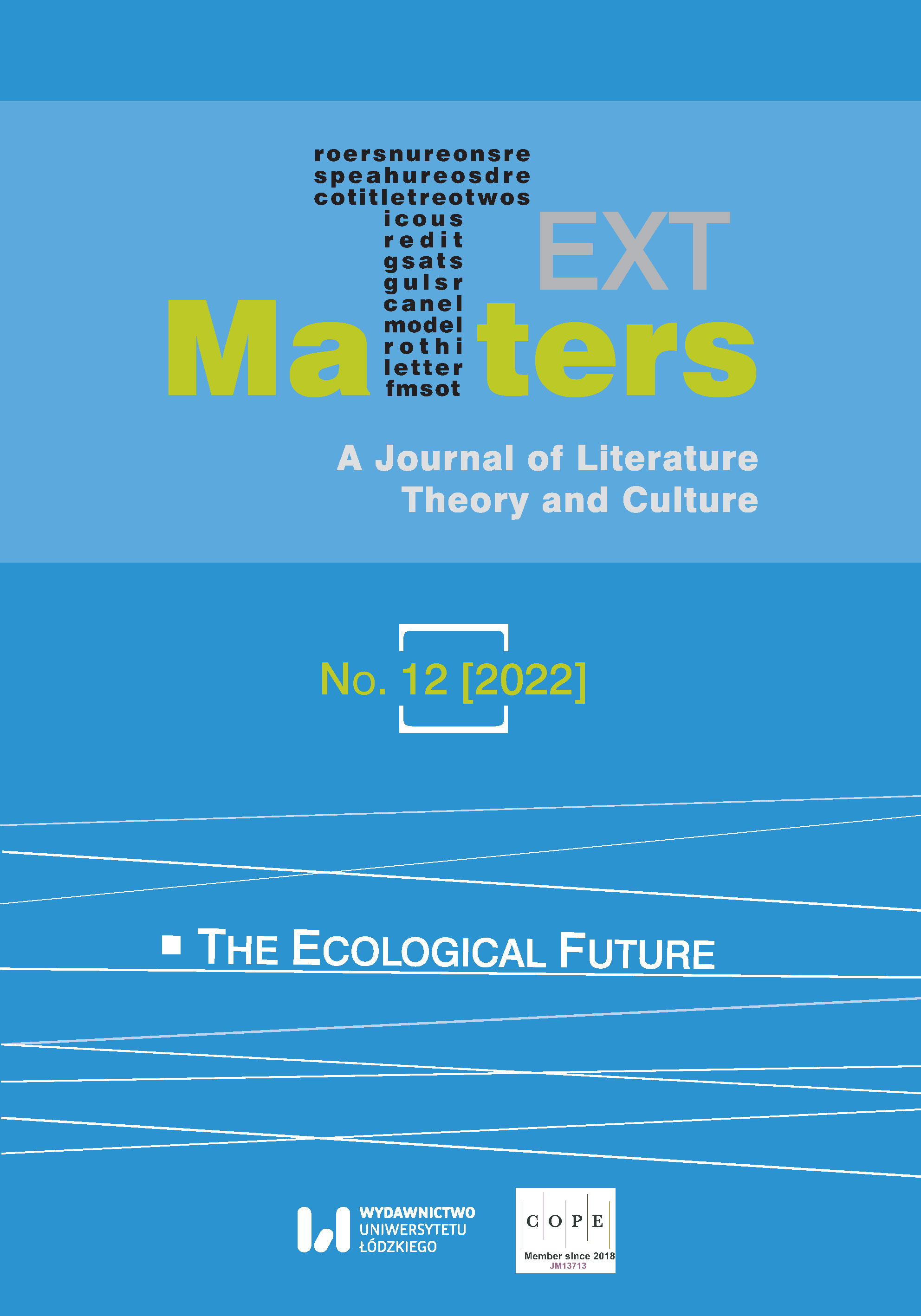Echoes of Rituals of Initiation and Blood Sacrifice in Heart of Darkness by Joseph Conrad
DOI:
https://doi.org/10.18778/2083-2931.12.24Keywords:
ritual, initiation, sacrifice, Conrad, Kurtz, identity, folkloreAbstract
In Heart of Darkness, the protagonist Kurtz, of whom we do not, in fact, see much, is shown as connected with a native “sorcerer,” a “witch-man,” who had “antelope horns” on his head. Antelopes, or goats, are typical sacrificial animals, and the protagonist of this novella is a European who perishes in the midst of tropical forests, in spite of the high hopes that accompany his decision to try his luck in an exotic environment. Kurtz has promising beginnings, but later he gradually degenerates, carrying out what may be called a reversal of the ritual of initiation, comparable to the inverted ritual, to use V. Propp’s term, in folklore. In this sense, he may be regarded as a counterpoint to Conrad himself whose life can easily be described as a modern and uncommonly successful enactment of the same ritual. Meanwhile, Kurtz’s, and to a lesser extent also Marlow’s, failure as initiates is inscribed in the failure of the European civilization to construct a European empire in Africa.
Downloads
References
Adamowicz-Pośpiech, Agnieszka. “Pojedynek czy samobójstwo?: fikcja i fakty w utworach Josepha Conrada.” Tytuł, vol. 47/48, 2003, pp. 86–133.
Google Scholar
Brunt, P. A. “Reflections on British and Roman Imperialism.” Comparative Studies in Society and History, vol. 7, no. 3, 1965, pp. 267–88. https://doi.org/10.1017/S0010417500003686
Google Scholar
DOI: https://doi.org/10.1017/S0010417500003686
Campbell, Joseph. A Joseph Campbell Companion: Reflections on the Art of Living. Edited by Robert Walter. Joseph Campbell Foundation, 2011.
Google Scholar
Campbell, Joseph. The Hero with a Thousand Faces. Fontana, 1993.
Google Scholar
Chwalewik, Witold. “Conrad and Literary Tradition.” Joseph Conrad Korzeniowski. Essays and Studies, edited by Mieczysław Brahmer, Państwowe Wydawnictwo Naukowe, 1958, pp. 29–38.
Google Scholar
Conrad, Joseph. Heart of Darkness and Other Stories. Könnemann, 1999.
Google Scholar
Conrad, Joseph. Listy [Letters]. Translated by Halina Carroll-Najder. Edited by Zdzisław Najder. Państwowy Instytut Wydawniczy, 1968.
Google Scholar
Conrad, Joseph. The Mirror of the Sea & A Personal Record. Edited by Zdzisław Najder. Oxford UP, 1988.
Google Scholar
Conrad, Joseph. The Nigger of the “Narcissus.” Edited by Cedric Watts. Penguin, 1988.
Google Scholar
Cooper, Jean C. An Illustrated Encyclopedia of Traditional Symbols. Thames and Hudson, 1978.
Google Scholar
Dąbrowska, Maria. Szkice o Conradzie [Essays on Conrad]. Państwowy Instytut Wydawniczy, 1959.
Google Scholar
Durkheim, Emile. “The Dualism of Human Nature and Its Social Conditions.” Durkheimian Studies/Études Durkheimiennes, vol. 11, 2005, pp. 35–45. https://doi.org/10.3167/175223005783472211
Google Scholar
DOI: https://doi.org/10.3167/175223005783472211
Eliade, Mircea. Initiation, rites, sociétés secrètes. Naissances mystiques [Initiation, Rites, Secret Societies. Mystical Births]. Gallimard, 1959.
Google Scholar
Feder, Lillian. “Marlow’s Descent into Hell.” Nineteenth-Century Fiction, vol. 9, no. 4, 1955, pp. 280–92. https://doi.org/10.1525/ncl.1955.9.4.99p02527
Google Scholar
DOI: https://doi.org/10.1525/ncl.1955.9.4.99p02527
Helsztyński, Stanisław. “Joseph Conrad—Człowiek i twórca” [“Joseph Conrad—Man and Creator”]. Joseph Conrad Korzeniowski. Essays and Studies, edited by Mieczysław Brahmer, Państwowe Wydawnictwo Naukowe, 1958, pp. 39–60.
Google Scholar
Hervouet, Yves. “Joseph Conrad and the French Language: Part One.” Conradiana, vol. 11, no. 3, 1979, pp. 229–51.
Google Scholar
Jabłkowska, Róża. Joseph Conrad (1857–1924). Zakład Narodowy im. Ossolińskich, 1961.
Google Scholar
Kipling, Rudyard. The Works of Rudyard Kipling. The Wordsworth Poetry Library, 1994.
Google Scholar
Lüthi, Max. Das europäische Volksmärchen. Form und Wesen [The European Folktale: Form and Nature]. Francke Verlag, 1985.
Google Scholar
Milton, John. Poetical Works. Edited by Douglas Bush. Oxford UP, 1974.
Google Scholar
P. Vergilius Maro, Aeneid. The Latin Library, http://www.thelatinlibrary.com/verg.html accessed 22 July 2022.
Google Scholar
Propp, Władimir. Historyczne korzenie bajki magicznej [Historical Roots of the Wondertale]. Translated by Jacek Chmielewski. Wydawnictwo KR, 2003.
Google Scholar
Propp, Vladimir. Theory and History of Folklore. Translated by Ariadna Y. Martin and Richard P. Martin. Edited by Anatoly Liberman. Manchester UP, 1984.
Google Scholar
Raghavan, Narasimhan Iyer. ”Individuation and Initiation.” Theosophy Trust, https://theosophytrust.org/847-individuation-and-initiation accessed 1 Mar. 2022.
Google Scholar
Sri Chinmoy. “Initiation and the Master.” Sri Chimnoy Library, https://www.srichinmoylibrary.com/prd-22 accessed 1 Mar. 2022.
Google Scholar
Vidan, Ivo. “Some Aspects of Structure in the Works of Conrad.” Joseph Conrad Korzeniowski. Essays and Studies, edited by Mieczysław Brahmer, Państwowe Wydawnictwo Naukowe, 1958, pp. 19–28.
Google Scholar
Virgil. The Aeneid. Translated by John Jackson. Wordsworth Classics, 1995.
Google Scholar
Published
How to Cite
Issue
Section
License

This work is licensed under a Creative Commons Attribution-NonCommercial-NoDerivatives 4.0 International License.













